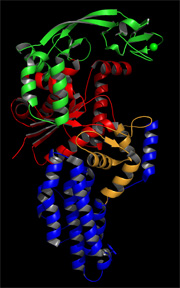
The Alexander Lab
Rebecca W. Alexander
Department of Chemistry
Wake Forest University
Research Interests: We are interested in understanding protein-nucleic acid interactions at the molecular level
My research program is centered on understanding mechanisms associated with protein-nucleic acid interactions that facilitate transcription of RNA, translation of proteins, and RNA structural changes. Transcription factor proteins recognize promoter sequences in order to produce the RNA message that is the template for polypeptide synthesis. Subtle differences in atomic groups present at the solvent-exposed surface of DNA may not affect the DNA’s ability to form its native double helix structure, but may have a significant impact on protein-DNA interactions. For example, transcription factor binding may be inhibited by covalent adducts formed by DNA-targeting drugs; the site of drug binding will determine whether transcriptional inhibition is general or gene-specific. Specific projects focus on how protein and nucleic acid sequences and structures specify molecular interactions that are essential to chemical catalysis and information transfer within an organism.
One specific family of proteins we study are the aminoacyl-tRNA synthetases, a family of enzymes that attach amino acids to specific transfer RNA (tRNA) molecules, thereby establishing the genetic code that dictates which amino acid matches which trinucleotide codon of the transcribed RNA message. Recognition of a unique tRNA by a synthetase enzyme is essential to translational accuracy, yet may depend on a very few atomic interactions. Although most features of protein biosynthesis are conserved throughout evolution, some organisms have acquired adaptive mechanisms to function at environmental extremes. For example, reduced temperature stabilizes RNA structure, which is not necessarily favorable for the ribosome, which contains numerous precisely assembled protein:RNA interactions and acts as a macromolecular machine to move along a messenger RNA. Many bacteria therefore have cold-induced proteins that enzymatically harness the free energy of ATP hydrolysis to unwind or otherwise destabilize structures in ribosomal or messenger RNA so that cellular processes can continue even at low temperature.
The projects in my lab use a variety of techniques (protein engineering, kinetic analysis, binding studies, PCR amplification, nucleic acid synthesis and purification, and spectroscopy) to answer biochemical questions on a molecular level. We also have collaborations with researchers who use computational methods, genetics, X-ray crystallography, and mass spectrometry to probe molecular interactions and mechanisms.
Rebecca W. Alexander
Department of Chemistry
Wake Forest University
Winston-Salem, NC 27109
alexanr@wfu.edu
336-758-5568 (phone)
336-758-4656 (fax)